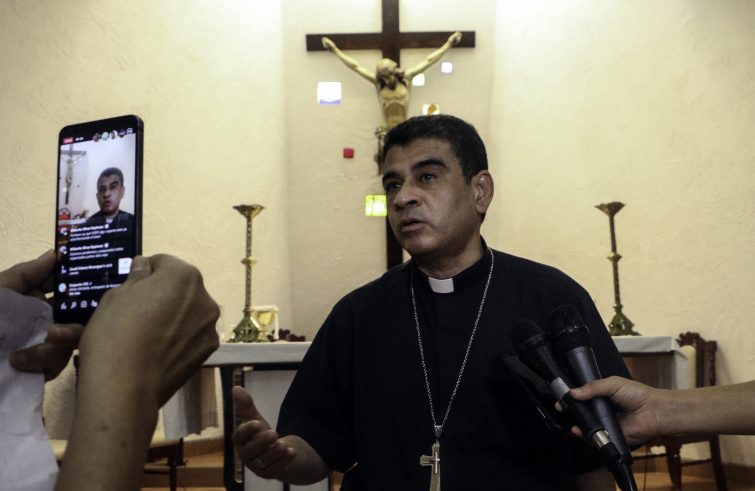
The news began to circulate last evening and was swiftly confirmed, first unofficially and then officially, by a communiqué from the Nicaraguan Presidency.
Msgr. Rolando Álvarez, bishop of Matagalpa and apostolic administrator of Estelí, arrested on 19 August 2022 and sentenced by the dictatorship of Daniel Ortega and Rosario Murillo to 26 years in prison on 10 February 2023, have been released and immediately exiled from Nicaragua with a flight to Rome.
With him were Msgr. Isidoro Mora Ortega – who had been imprisoned for a few weeks – 15 other priests and two seminarians. They all concelebrated a special Mass, returning to wear their liturgical vestments as seen in the first pictures of the two exiled bishops, who were received and entrusted to the care of the Holy See.
Ortega’s gratitude to the Pope.
The central role of the Vatican in the development of events is confirmed in the Managua government’s communiqué, issued shortly after 10pm (Italian time):
“The Presidency of the Republic, the Government of National Reconciliation and Unity and the people of Nicaragua are most grateful to the Holy Father, Pope Francis, to the Secretariat of State of the Holy See, to its head, His Eminence Cardinal Pietro Parolin, and to his entourage, for the most respectful and discreet coordinated efforts to permit two bishops, fifteen priests and two seminarians to travel to the Vatican,” declared the Ortega administration in the note.
“The Sandinista criminal dictatorship has not succeeded in defeating the power of God,” Monsignor Silvio José Báez, auxiliary bishop of Managua, said from Miami, where he lives in exile. Msgr. Báez expressed his heartfelt gratitude to Pope Francis “for his concern, for his closeness, for his affection for Nicaragua” and praised “the efficacy of Vatican diplomacy.”
This is important news that puts an end to the utterly arbitrary, unjust and unacceptable arrests. In particular
Bishop Álvarez’s case has been at the centre of strong stances taken by international organisations, governments and NGOs for months.
At the same time, this latest development testifies to the total lack of democracy and respect for religious freedom in the Central American country today, given that the only alternative to imprisonment is in fact exile, deportation from one’s homeland.
A long and complex matter. It has to be said that this was reportedly the third time that diplomatic efforts have been made for the bishop’s release. First, on the eve of his 26-year sentence, he had refused to be deported to the US along with 222 exiled dissidents. In early July, news emerged of a second attempt at mediation. This too had failed. An unprecedented escalation in the persecution of the Catholic Church was reported in mid-December, resulting in the arrest of Msgr. Mora along with numerous priests. It is now clear that it was a cynical way of “having more ammunition”, raising the stakes of a possible negotiation, facilitating Msgr Álvarez’s release by linking it to that of other confreres.
In any event,
the large number of Nicaraguans living in exile welcomed the good news gladly.
The details of the negotiations and the players involved, apart from the Vatican, are being kept secret, but it is believed that Venezuela and its president, Nicolás Maduro, could be involved.
The following is the complete list of the religious freed: Msgr. Rolando José Álvarez Lagos, Bishop of Matagalpa; Msgr. Isidoro Del Carmen Mora Ortega, Bishop of Siuna; the priests Oscar José Escoto Salgado, Jader Danilo Guido Acosta, Pablo Antonio Villafranca Martínez, Carlos José Avilés Cantón (vicar general of the archdiocese of Managua) Héctor Del Carmen Treminio Vega, Marcos Francisco Diaz Prado, Fernando Isaías Calero Rodríguez, Silvio José Fonseca Martínez, Mikel Salvador Monterrey Arias, Raúl Antonio Zamora Guerra, Miguel Agustín Mantica Cuadra, Jhader Antonio Hernández Urbina, Gerardo José Rodríguez Pérez, Ismael Reineiro Serrano Gudiel, José Gustavo Sandino Ochoa; seminarians Tonny Daniel Palacio Sequeira e Alester De Jesús Sáenz Centeno.
Persecuted but vibrant Church.
“I consider this to be great news, especially for Catholics in Nicaragua”
– exiled Nicaraguan journalist Israel González Espinoza, one of Nicaragua’s most knowledgeable commentators on the Church, told SIR from Madrid. “Their release is undoubtedly due to the tireless mediation of the Holy See and other international actors. Above all, it confirms the mission, the dignity and the love of Monsignor Rolando Álvarez for the Gospel and for his people. Moreover, the forced deportation is a flagrant violation of human rights, and this aspect cannot be overlooked either. But the fact remains that exile is preferable to humiliating imprisonment.”
The journalist confirms that the presence of the other bishop, priests and seminarians probably played a decisive role: “In my opinion, the regime was in a weak position because of the enormous international pressure on the case of bishop Álvarez. The mass arrest of priests was intended to give the regime more room for manoeuvre in the negotiations. On this issue, the regime was at an impasse and its reputation was rapidly deteriorating.”
But the fact remains that the Church in Nicaragua is increasingly weak and silenced, deprived of a third of its bishops (the two now in exile and Monsignor Baez).
Nevertheless, González Espinoza sees signs of hope: “The Church in Nicaragua is a Church that has been forced into silence, but it remains the only institution that is not under the control of the regime, which is trying in every way to eradicate the Church and its activities, which continue to be highly valued and appreciated by the entire population. In the last few hours I have again spoken with a number of Catholics in Nicaragua who assure me that they remain determined to continue their evangelical witness.”
(*) journalist at “La vita del popolo”










